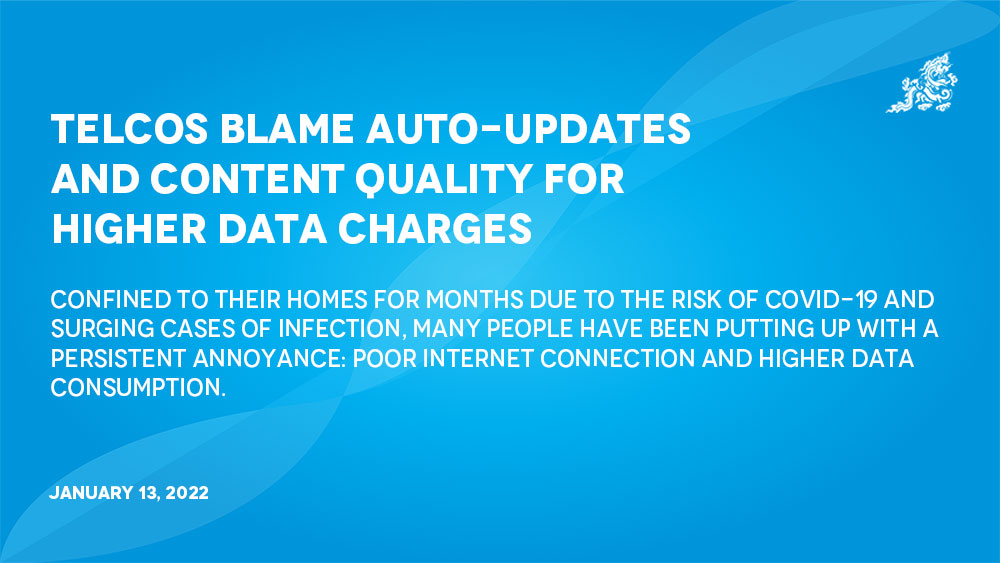Phub Dem
Confined to their homes for months due to the risk of Covid-19 and surging cases of infection, many people have been putting up with a persistent annoyance: poor internet connection and higher data consumption.
Bhutan Telecom (BT) and TashiCell maintain that data consumption depends on the user’s network speed, usage, and default app setting.
The telecoms attribute slower internet speed to an increasing number of 4G network users, leading to congestion.
The issue of high data charges with Bhutan Telecom and TashiCell was also discussed in the recently concluded National Assembly.
A corporate employee, Tshering, said that telecom operators had increased the data volume, but the consumption was even higher.
Another user, Sonam Yoezer, said that it was difficult to focus on esports and other online opportunities with slower internet. “The internet charges are expensive.”
According to TashiCell’s marketing manager, Namgay Wangchuk, despite an increase in expenditures such as salary, rent, electricity, transportation charges, fuel prices, TashiCell had consistently managed to reduce internet charges.
He said that the increase in 4G network users leads to congestion, adding that the company has been adding new sites and expanding the capacity of existing sites. He said that TashiCell was not yet able to solve the congestion, especially during peak hours.
While the company added new sites, Namgay Wangchuk said it was difficult to get land to establish towers, reasoning that the introduction of 5G will help to overcome this issue. “3G is much slower technology compared to 4G. When a 4G customer switches to a 3G network, his experience will be poor, and users complain about it.”
He said that data consumption depends on the content and quality one accesses online. If the internet speed is good, most apps automatically use higher resolution data to provide a better experience unless manually set by the user. “Therefore, consumption will differ for the same video watched with different network speeds.”
He said some apps preload data to avoid buffering, consuming a massive amount of data. “Even when we do not completely watch a video, the data is already preloaded by the app and hence can lead to higher data consumption.”
He said that users could manually configure the app and viewing experience by setting the video setting in Youtube to the lowest quality, restricting the autoplay option in Facebook, restricting app updates, and enabling data-saver for individual apps to minimise data consumption.
Bhutan Telecom’s marketing manager, Jigme Thinley, said telcos would not deliberately reduce internet speed. He said that if the download speeds are slower, it could be due to the increasing number of users leading to congestion, or degraded towers, technical faults, and external signal interferences.
He said that BT’s priority remains to invest and procure extra resources to decongest and improve the customer experience. “Telcos are responsible, and it’s their mandate to ensure reliable and good quality internet services.”
He added that slower internet speed could be because of issues with the source of content providers. By way of example, he said that if the Ministry of Education’s app for Class 12 is overly congested due to students trying to access it simultaneously, the connectivity will be slow, even if the mobile data speed is high. “Such cases are beyond the control of the telcos.”
Jigme Thinley said that data consumption depends on how users set and configure their devices to use or consume data.
According to Bhutan InfoComm and Media Authority’s (BICMA) report, the country significantly reduced the tariff of voice, data, and SMS despite rising prices of essential items.
From 2017 to 2020, the internet data tariff was reduced by 40 percent, voice by 10 percent, and SMS by 21 percent. It states that BICMA will continue to regulate tariffs and, when feasible, shall ensure reductions based on the market situation.
As per the recent International Telecommunication Union (ITU) study report, Bhutan is ranked 64th in the world and third in the South Asia region after Sri Lanka and Pakistan in terms of affordability.


